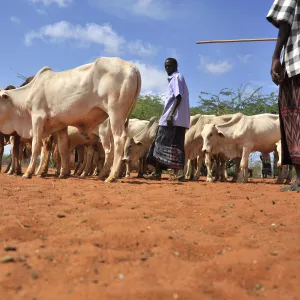Beyond smartphones: How citizen volunteers are supporting the drylands livestock market intelligence platform KAZNET in Kenya
In the drylands of Kenya, the digital transformation of livestock markets is gathering pace, and contributing to that is a platform named KAZNET, developed by the International Livestock Research Institute (ILRI) with support from the United States Agency for International Development and the United Kingdom Foreign, Commonwealth & Development Office (FCDO), and scaled through Accelerating Impacts of CGIAR Climate Research

Beyond smartphones: How citizen volunteers are supporting the drylands livestock market intelligence platform KAZNET in Kenya
In the drylands of Kenya, the digital transformation of livestock markets is gathering pace, and contributing to that is a platform named KAZNET, developed by the International Livestock Research Institute (ILRI) with support from the United States Agency for International Development and the United Kingdom Foreign, Commonwealth & Development Office (FCDO), and scaled through Accelerating Impacts of CGIAR Climate Research for Africa (AICCRA) project, Supporting Pastoralism and Agriculture in Recurrent and Protracted Crises (SPARC) project and the CGIAR Initiative on Livestock and Climate.
KAZNET provides demand-driven market intelligence for livestock keepers in arid and semi-arid lands of Kenya and Ethiopia.
This platform is now integrated into the government-led Kenya Agricultural Observatory Platform managed by the Kenya Agricultural and Livestock Organization to enhance the delivery of real-time livestock market data, supplementing the Kenya Integrated Agricultural Management Information System.
Photo: Livestock market in Wajir (credit: ILRI/Riccardo Gangale)

